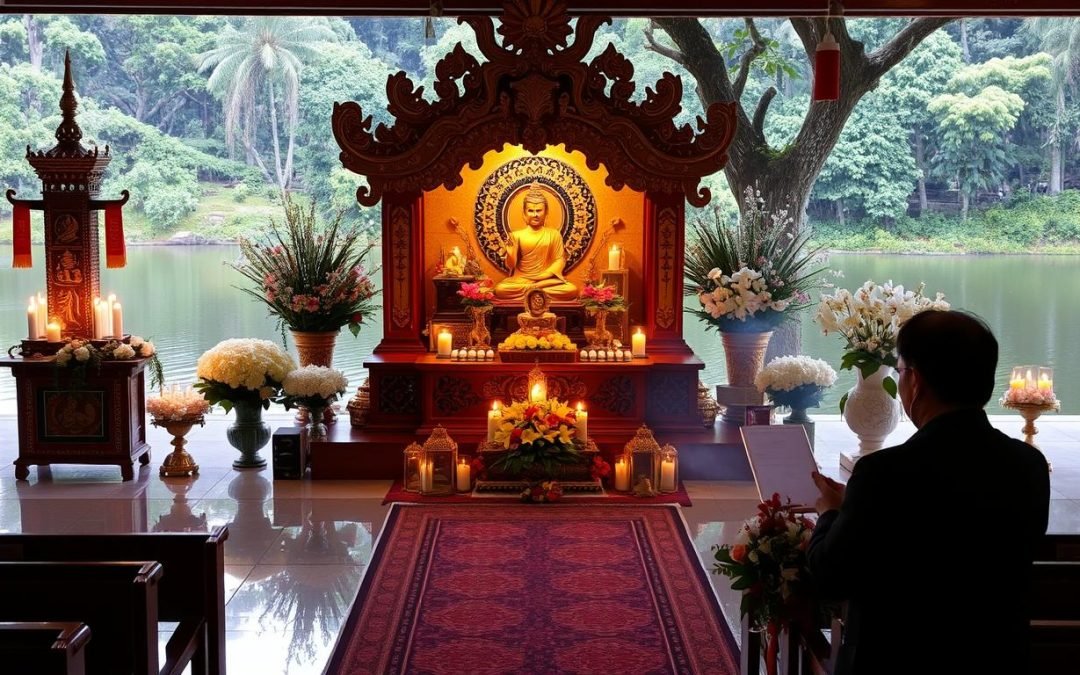Buddhist funeral services are very important in Singapore, where Buddhism is a big part of the culture. At least 60% of people here believe in Buddhism. It’s key for families to understand these traditions when they lose a loved one.
Many people are choosing Buddhist funerals over Taoist ones. They like the simplicity and structure of Buddhist ceremonies. This guide will help families plan a funeral that honors their Buddhist beliefs.
The cost of a Buddhist funeral in Singapore varies. It can be from S$5,988 for a 3-day service to S$6,988 for a 5-day service. This makes it affordable for many.
Funeral packages usually include important items like the casket, embalming, and transport. Because land is rare in Singapore, cremation is common among Buddhists. During the funeral, rituals like chanting by monks bring comfort and help the soul’s journey.
Understanding Buddhism and Its Beliefs
Buddhism is a deep spiritual tradition started by Siddhartha Gautama. It focuses on key ideas that are central to its teachings. At the heart of Buddhism is the belief in a cycle of life and death called saṃsāra. This cycle shows how life and death are linked by karma, meaning our actions in one life shape our future lives.
Reincarnation is a big part of these beliefs. It shows how we keep moving from one life to another. This cycle highlights the importance of Buddhist funeral ceremonies. They help guide the departed towards a better rebirth, showing respect for the fleeting nature of life and the power of our actions.
Buddhism believes in six realms of existence, each influenced by karma: the god realm, demigod realm, human realm, animal realm, hungry ghost realm, and hell realm. Knowing about these realms helps shape the rituals of funeral services. They aim to help the deceased find a better place in the next life.
Buddhist teachings stress the value of compassion, reflection, and respect during ceremonies. These rituals include chanting, prayers, offerings, and sharing of merits. These actions honor the deceased and bring the community together. They help everyone remember and heal together.
In short, Buddhism adds depth to funeral services. The respect shown in these ceremonies reflects the religion’s core values. It blends life and death with a focus on enlightenment and compassion, making the experience meaningful for everyone involved.
The Significance of Buddhist Funeral Services
Buddhist funeral services are deeply meaningful in the community. They show a deep understanding of life, death, and the spiritual transition of the deceased. These ceremonies help guide the soul of the departed toward rebirth.
They are not just about mourning. They are also about helping the loved one who has passed. Families do these practices to earn merit for their loved ones. This helps them smoothly move into their next life.
The ceremonial importance of these services is clear. Many rituals are performed during the mourning period. Services happen on important days like the 3rd, 7th, 49th, and 100th days after death.
Each ceremony has its own purpose. It allows family and friends to remember the deceased. It also honors them properly.
Services last from 45 to 75 minutes. They are tailored to the wishes of the deceased and the family. The ceremonies often end with cremation, showing the impermanence of life and the spiritual transition of the individual.
In places like Singapore, Buddhist funeral services blend well with cultural practices. Cremation is a common choice here.
Along with the main service, there are other rituals. These rituals show support for the bereaved. The cost of a basic Buddhist funeral package ranges from SGD 4,000 to 18,000.
But, families often spend more on things like transportation, catering, floral arrangements, and memorial items. These extra costs add to the overall experience.
In summary, the Buddhist funeral significance comes from spiritual practices, community support, and respect for life and death. Families involved in these services mourn but also celebrate the soul’s journey.
Buddhist Funeral Rituals and Customs
Buddhist funeral rituals are key in honoring the deceased and helping those who mourn. In Singapore, these customs blend traditional and modern practices. The Mahayana school’s influence shapes these rituals, adding depth and meaning.
Funerals can take place at homes, outdoor spots, or funeral parlors. The setting is simple yet solemn. The use of yellow and white tentage symbolizes purity and enlightenment, making the space a meaningful tribute.
- Chanting of Buddhist prayers, led by monks, is a core part of these rituals. Family and friends join in, sharing in the mourning.
- Offerings like burning paper effigies and vegetarian food are common. They honor the deceased and are part of the tradition.
- The services last for an odd number of days, like three, five, or seven. This includes various commemorative rites.
Mourning goes beyond the funeral, with prayers every seven days for up to 49 days. Many families choose Buddhist services for the comfort and peace they offer.
Helping others or doing good deeds in the deceased’s name is encouraged. It helps build good karma and enriches their legacy. Guests are asked to wear dull colors to show respect and dignity.
This approach meets the spiritual needs of the bereaved and emphasizes community support. It guides the soul in the afterlife and brings friends and family together during tough times.
The Role of a Funeral Director
In Singapore, a funeral director is key in supporting families during tough times. They help with arranging funerals and make sure cultural practices are followed. They manage things like transportation and work with Buddhist monks for rituals.
Planning a funeral can be very hard. A good funeral director makes it easier by giving professional guidance. They help pick the right place for the funeral and make sure it fits the family’s wishes.
Funeral directors in Singapore know how important rituals are. They help families use white flowers for purity and give alms to monks. This way, families can honor their loved ones while following traditions.
Here’s a table showing what funeral directors do:
| Service | Description |
|---|---|
| Cremation Arrangements | Coordinate cremation services and manage logistics accurately. |
| Ritual Coordination | Engagement of monks for prayers and rituals based on family requests. |
| Transportation | Ensure timely transport of the deceased between locations. |
| Embalming | Conduct the embalming process, typically handled by qualified professionals. |
| Pre-Planning Services | Facilitate financial solutions for families considering pre-planning. |
Working with a dedicated funeral director helps families say goodbye in a respectful way. It lets them focus on healing during a hard time.
Buddhist Funeral Services
Buddhist funeral services honor the deceased and comfort grieving families. Families can pick from various packages that fit different needs and budgets. These packages include services like transporting the body, setting up the wake, and providing a casket. They also include monk-led prayers.
This flexibility helps families create a meaningful farewell that follows Buddhist beliefs.
Core Services Included in Funeral Packages
The core services in Buddhist funeral packages follow traditional practices. They include:
- Transportation of the deceased
- Embalming and casket furnishing
- Wake setup with essential items such as lotus and white flowers
- Chanting of Buddhist sutras by monks
- Location options for holding wakes
Packages start at around $5,500 for three-day services. This reflects the detailed nature of these arrangements. Families can choose personalized options to honor their loved ones while following Buddhist traditions.
Cremation vs. Burial Arrangements
In Singapore, families must decide between cremation and burial. Traditional beliefs often favor cremation, symbolizing life’s impermanence. Many Buddhist families choose cremation, mainly due to urban space limitations.
The cost of a Buddhist funeral varies, from $5,000 to $10,000, based on the chosen arrangements.
Burial options are less common but respected. They are chosen by those who value physical gravesites. The focus is on honoring the deceased and supporting loved ones during their grief.
Common Buddhist Funeral Traditions
Buddhist funeral traditions show the importance of respecting the deceased. They involve setting up altars with offerings like fruits and incense. This setup is both spiritual and creates a peaceful space for mourners.
The wake customs highlight community support. Families often allow a grieving period of up to 100 days. Services are held on specific days, like the third, seventh, and 49th days after the person’s passing.
During these ceremonies, people focus on quiet contemplation. They wear white, showing respect and simplicity. Lighting joss sticks at the altar is a key ritual, symbolizing respect and homage.
After the initial wake, services can last for weeks. This includes weekly observances that strengthen the community’s bond with the deceased.
Combining old traditions with modern practices is key. For those looking into funeral services in Singapore, Buddhist funeral options in Singapore are available. These services honor Buddhist customs and provide respectful, transparent services for families.
| Aspect | Description |
|---|---|
| Mourning Period | Lasts up to 100 days with significant observances on specific days |
| Attire | Mourners wear white, avoiding bright colors or displays of wealth |
| Ritual Practices | Includes lighting joss sticks, offerings fruits, and chanting |
| Wake Services | Allows for communal grieving and respect for the deceased |
| Funeral Custom | Simple services, generally with the presence of monks and community members |
Preparation for a Buddhist Funeral
Preparing for a Buddhist funeral requires careful attention to detail. It ensures all arrangements match cultural and spiritual beliefs. Wake arrangements are key, providing a space for family and friends to gather and express condolences. Creating a peaceful environment reflects Buddhist values and honors the deceased.
The Wake Setup
The wake lasts between three to five days, giving loved ones time to pay their respects. It’s important to set up a space for reflection and remembrance. Key elements include:
- Floral tributes: White lotuses are often chosen, symbolizing purity and enlightenment.
- Altar arrangements: A respectful portrait of the deceased is placed at the altar, surrounded by offerings.
- Seating provisions: Comfortable seating is arranged for mourners to share memories.
Preparing the Deceased
Preparing the deceased is a vital and intimate ritual. This process includes:
- Cleansing: The deceased is cleansed, honoring their journey and preparing them for the afterlife.
- Dressing: The deceased is dressed in simple, modest attire, reflecting Buddhist values.
- Casket selection: The casket choice is made with respect, ensuring it aligns with the family’s beliefs.
Buddhist Funeral Etiquette and Expectations
Going to a Buddhist funeral in Singapore means knowing certain customs. These customs show respect for the deceased and their family. It’s important to tell the family you’re coming to the wake. This lets them prepare and have space during a tough time.
The wake lasts from three to seven days. During this time, people can join in different rituals. They often put offerings at an altar with the deceased’s picture. Lighting a joss stick is a common way to show respect.
Monks lead ceremonies on the first and last nights of the wake. They chant to help the deceased move on peacefully. This shows how important monks are in keeping funeral etiquette right.
Wearing modest, conservative clothes is key. Guests usually wear black, while family members wear white. Avoiding bright colors and showing off wealth is seen as not respectful.
Donating money, called “Bai Jin” or “Peh Kim,” is welcome but not required. Giving odd amounts, like $30 or $50, is seen as lucky. Sending cards or flowers is also a thoughtful way to support the family.
At the funeral’s end, families might thank guests with small gifts. These gifts, like coins and hand towels, show they value your presence. This support is a big part of showing respect during the ceremony.
Clothing and Attire for a Buddhist Funeral
Choosing the right funeral attire is key when attending a Buddhist funeral. It shows respect and solemnity. People should follow certain guidelines to honor the customs and the grieving family.
Muted colors like white, black, dark green, dark blue, or grey are best. Avoid bright colors like red, yellow, or orange. They are seen as disrespectful. This dress code shows the importance of the moment, helping everyone remember the deceased.
For men, a casual yet formal outfit is best. A polo shirt or muted t-shirt with trousers is good. Shorts or Bermuda pants are not recommended. Women should wear modest, not too revealing clothes. Low-cut blouses or miniskirts are not suitable.
Footwear is also important. Covered shoes are a must, while slippers or sandals are not. You might find a pail of blessed water at the exit for cleansing.
It’s common to bring offerings like flowers or fruits. These are important in the rituals. Also, giving monetary gifts, known as bai jin (白金), helps with funeral costs. Monks lead the ceremonies, including closing the casket. It’s customary to show respect by not looking at the casket when it’s sealed.
By following these guidelines and dressing respectfully, everyone can help create a solemn atmosphere at Buddhist funerals in Singapore.
Buddhist Funeral Prayers and Chants
Buddhist funeral prayers are very important. They help guide the soul of the deceased to a peaceful place. Monks lead these prayers, using Buddhist scriptures to support the soul and the family.
The Diamond Sutra is a key text recited. It helps generate merit for the departed, aiding in their rebirth. The rituals include chanting sessions over three days. These sessions are timed for key moments like the casket’s arrival and the final farewell.
The chanting rituals create a peaceful atmosphere. Family and friends listen closely to the chanting. The ceremony follows a 49-day mourning period, divided into three stages.
These prayers and chants show community support and guide the deceased’s spirit. They reflect compassion and respect, honoring the cycle of life and reincarnation. Each chant and prayer wishes for a smooth transition, bringing peace to the bereaved.
Post-Funeral Customs and Rites
In Buddhist tradition, the time after the funeral is very important. It’s marked by post-funeral rituals, like 49-day prayers. These prayers are a way for family and friends to mourn and honor the deceased.
During these 49 days, people do good deeds to help the soul of the deceased. This helps the soul on its journey after death.
The 49th-day ceremony is a key moment. It’s when the Ancestral Tablet is moved to its final place. This shows the belief in life and rebirth in Buddhism.
At this time, families also do Gong Teck ceremonies. These ceremonies include offerings and rituals that connect them with their ancestors.
Prayers and ceremonies continue long after the funeral. For example, there’s a 100th-day ceremony to mark the soul’s transition. During these rituals, families remember the virtues and successes of the deceased.
Memorial practices help families cope with their loss. They offer comfort and guidance. Families often come together for prayers, creating a supportive community.
Participating in these rituals is very important. It keeps the memory of the deceased alive. It also shows the cycle of life and death, enriching the spiritual journey of those left behind.
Conclusion
Understanding Buddhist funeral customs can make saying goodbye to loved ones more meaningful. This article has covered many aspects of Buddhist funerals. It talked about monks leading the ceremonies and the importance of cremation.
Each custom is a way for families to show respect and compassion. These moments are very important.
Final thoughts on Buddhist funerals highlight the importance of tradition. Participating in prayers and creating altars are key parts. They bring people together and offer spiritual support.
These rituals, whether at home or in religious sites, are deeply meaningful. They reflect Buddhism’s teachings on the fleeting nature of life.
Knowing about these practices helps families in Singapore deal with grief. It ensures a dignified farewell that respects the deceased’s beliefs and values.
FAQ
What are the common Buddhist funeral customs in Singapore?
How do Buddhist funeral services aid in the grieving process?
What role do funeral directors play in Buddhist funeral services?
What should family members wear to a Buddhist funeral?
What are some important etiquette practices to follow during a Buddhist funeral?
Why is prayer and chanting significant in Buddhist funerals?
What preparations are necessary for a Buddhist funeral?
How are post-funeral customs observed in Buddhism?
Source Links
- https://www.funeralservicessingapore.com.sg/buddhist-funeral-singapore/
- https://www.funeralgroup.com.sg/singapore-funeral-packages/buddhist-funeral-services
- https://memorialfuneral.com.sg/blog/understanding-buddhist-funeral-ceremonies-and-beliefs-about-death-in-singapore/
- https://www.singaporefuneralcommittee.sg/understanding-buddhist-funeral-services-in-singapore/
- https://www.confidencefuneral.com.sg/blogs/all-you-need-to-know-about-buddhist-funerals/
- https://www.funeralpartners.co.uk/help-advice/arranging-a-funeral/types-of-funerals/buddhist-funerals/
- https://www.zenboxcatalyst.com.sg/understanding-buddhist-funeral-services-traditions-rituals-and-costs-in-singapore/
- https://embracefuneralservices.com.sg/buddhist-funeral-singapore/
- https://www.singaporecasket.com.sg/preparing-a-buddhist-funeral-in-singapore/
- https://www.nirvanafugui.com/funeral-job/
- https://www.funeralservicessingapore.com.sg/planning-ahead-preparing-for-buddhist-funeral-services-in-singapore/
- https://www.confidencefuneral.com.sg/funerals/buddhist/
- https://www.singaporefuneralservices.sg/singapore-buddhist-funeral-services/
- https://www.funeralsanctuary.sg/buddhist-funeral-package/
- https://www.empathy.com/funeral/buddhist-traditions-in-death-and-mourning
- https://www.memorialplanning.com/resources/religious-funerals-guide/buddhist-funerals-guide
- https://www.alifegrad.com/preparing-for-a-buddhist-funeral-what-to-expect-and-how-to-participate/
- https://www.thelifecelebrant.sg/buddhist-funeral-services.html
- https://buddhistfuneralpackage.sg/how-to-prepare-for-a-buddhist-funeral-in-singapore/
- https://www.partinggoodbyes.com/blog-posts/buddhist-funerals-in-singapore
- https://www.funeralservicessingapore.com.sg/important-buddhist-funeral-rites-and-etiquettes-to-note/
- https://singaporebereavementplanners.com/understanding-the-etiquette-for-a-buddhist-funeral-in-singapore/
- https://www.nirvanafugui.com/buddhist-funeral-etiquette/
- https://memorialfuneral.com.sg/funeral-package/buddhist-funeral-package/
- https://www.singaporeobituary.com/guide-to-buddhist-funeral-prayer-rites/
- https://singaporebuddhistfunerals.com/buddhist-package/
- https://www.funeralgroup.com.sg/Parlours/buddhist-funeral-services
- https://eternityfuneral.sg/buddhist-funeral-ritual/
- https://directfuneral.com.sg/our-funeral-products-services/buddhist-funeral-packages/
- https://www.singaporefuneralcommittee.sg/buddhist-funeral-process/
- https://memorialfuneral.com.sg/blog/buddhist-funeral-rites-etiquette/
- https://www.funeralservicessingapore.com.sg/what-is-the-customs-followed-at-a-buddhist-funeral-in-singapore/




